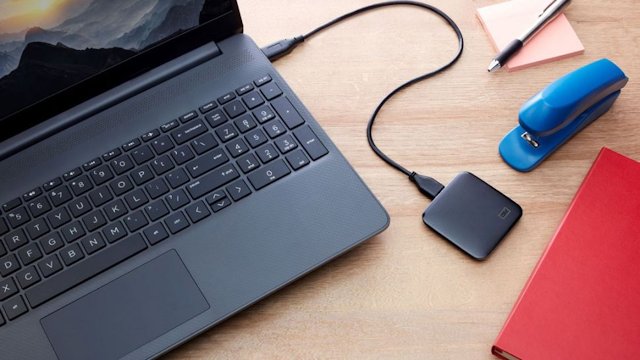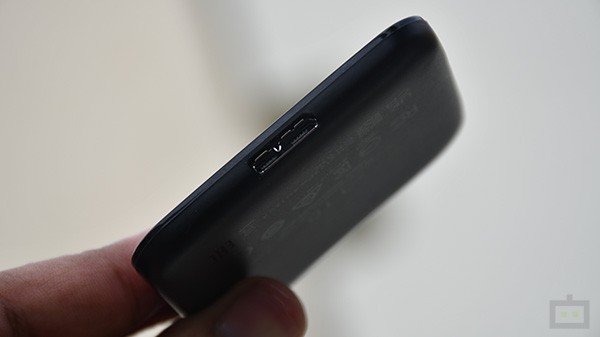First test WD Elements SE SSD 480GB and comparisons
I posted yesterday about local availability of fast flash drives. I am in Perth, Western Australia. I mentioned in that post that perhaps would buy a WD Elements SE SSD USB drive:
https://bkhome.org/news/202205/local-availability-of-fast-flash-drives.html
480GB external SSD for AU$59, seems like a good deal, on paper anyway. That's about 42 US Dollars. That price is including our 10% sales tax.
Couldn't resist it, went to a local Officeworks store and bought one.
For the initial testing, I thought it would be good to compare
with other flash sticks, from the worst to the best.
Regarding the worst, well, I threw that one away:
https://bkhome.org/news/201901/bottom-rung-usb-flash-stick.html
I do have a few others that are similar speed, but for the "worst" one to test, chose something slightly better, an Emtec 8GB USB2 stick.
Anyway, before the tests, some photos and initial observations. So small and light! It weighs only 26g (0.92oz) and the cable 21g. Photo:

You could slip that in a pocket and not even know it's there. So yeah, a great contender as a portable EasyOS.
The interface is "only" USB 3.0, my guess is that was because WD have a cheaper USB 3.0 based controller chip. Because, the company have obviously produced something at the lowest possible price. Showing the socket on the drive:

It doesn't even have an LED activity indicator -- not essential, but it would have been good to see an LED flashing, so you know when the drive is being accessed.
I have previously done comparisons of USB flash sticks, for example, this post, that also compares with HDDs:
https://bkhome.org/news/201812/thoughts-on-hdd-and-ssd-speed.html
Speed tests
A few people have reported to me that EasyOS is slow to bootup, the first time it boots. A couple of reasons for that...
Firstly, the ext4 working-partition is expanded to fill the drive. The bigger the drive, the longer that will take. More important is the write-speed of the flash drive.
Secondly, 'easy.sfs' is copied from the boot-partition to the working-partition. This to support future rollback. Easy has very sophisticated rollback and roll-forward support; you can rollback to an earlier snapshot or an earlier version, and the same roll-forward.
'easy.sfs' in Easy Bookworm version 0.1 is 648MB, and the time taken to copy can vary enormously. This is where users are reporting a bad experience. So, let's start with the worst flash stick...
Emtec 8GB USB2
What I have done is written the EasyOS Bookworm version 0.1 image file to the drive, then booted it. I took the opportunity to try different block sizes when writing the file. Note, EasyDD is a frontend to the 'dd' utility, and it uses a block size of 1M. Here goes, drive plugged into a USB2 socket...
# dd if=easy-0.1-amd64.img of=/dev/sdb bs=1M conv=fsync status=progress oflag=sync
810549248 bytes (811 MB, 773 MiB) copied, 189.806 s, 4.3 MB/s
# dd if=easy-0.1-amd64.img of=/dev/sdb bs=2M conv=fsync status=progress oflag=sync
810549248 bytes (811 MB, 773 MiB) copied, 191.586 s, 4.2 MB/s
# dd if=easy-0.1-amd64.img of=/dev/sdb bs=4M conv=fsync status=progress oflag=sync
810549248 bytes (811 MB, 773 MiB) copied, 191.153 s, 4.2 MB/s
Next, booted the Emtec drive, and mentally counted the seconds
for 'easy.sfs' to copy from boot-partition to working-partition: 321 seconds ...over 5 minutes!
Wow, no wonder some users have complained.
Let's move up a notch. SanDisk have a range of USB flash sticks. The budget one is their "Cruzer Blade". Next-up is "Ultra" and next-up again is "Extreme". The first two are readily available in your local chain store. The Extreme range will be in more specialized stores. Starting with the Cruzer:
SanDisk Cruzer Blade 8GB USB2
Drive plugged into a USB2 socket...
# dd if=easy-0.1-amd64.img of=/dev/sdb bs=1M conv=fsync status=progress oflag=sync
810549248 bytes (811 MB, 773 MiB) copied, 73.2658 s, 11.1 MB/s
# dd if=easy-0.1-amd64.img of=/dev/sdb bs=2M conv=fsync status=progress oflag=sync
810549248 bytes (811 MB, 773 MiB) copied, 67.4644 s, 12.0 MB/s
# dd if=easy-0.1-amd64.img of=/dev/sdb bs=4M conv=fsync status=progress oflag=sync
810549248 bytes (811 MB, 773 MiB) copied, 65.4665 s, 12.4 MB/s
Getting better. Next, first-bootup, time to copy 'easy.sfs': 63 seconds
One minute is still far too long to wait, staring at the screen.
SanDisk Ultra 16GB USB3.0
This is the one I recommend as the lowest price yet reasonable performance. Officeworks here in AU have it for AU$13.65, capacity 32GB. Plugged into a USB3 socket...
# dd if=easy-0.1-amd64.img of=/dev/sdb bs=1M conv=fsync status=progress oflag=sync
810549248 bytes (811 MB, 773 MiB) copied, 18.2753 s, 44.4 MB/s
# dd if=easy-0.1-amd64.img of=/dev/sdb bs=2M conv=fsync status=progress oflag=sync
810549248 bytes (811 MB, 773 MiB) copied, 20.2607 s, 40.0 MB/s
# dd if=easy-0.1-amd64.img of=/dev/sdb bs=4M conv=fsync status=progress oflag=sync
810549248 bytes (811 MB, 773 MiB) copied, 19.3337 s, 41.9 MB/s
Bootup, time to copy 'easy.sfs': 20 seconds
Twenty seconds is not too long to be staring at the screen!
SanDisk Extreme 64GB USB3.0
This is not their latest model, they do have a USB3.1 model.
# dd if=easy-0.1-amd64.img of=/dev/sdb bs=1M conv=fsync status=progress oflag=sync
810549248 bytes (811 MB, 773 MiB) copied, 4.32428 s, 187 MB/s
# dd if=easy-0.1-amd64.img of=/dev/sdb bs=2M conv=fsync status=progress oflag=sync
810549248 bytes (811 MB, 773 MiB) copied, 4.27782 s, 189 MB/s
# dd if=easy-0.1-amd64.img of=/dev/sdb bs=4M conv=fsync status=progress oflag=sync
810549248 bytes (811 MB, 773 MiB) copied, 4.51486 s, 180 MB/s
First bootup, copying 'easy.sfs': 11 seconds
Now we're cooking!
Moving on, to the main purpose of this post, evaluating the new WD SSD...
WD Elements SE SSD 480GB USB3.0
Oh man, this was so fast, it took slightly more than the blink of an eye...
# dd if=easy-0.1-amd64.img of=/dev/sdb bs=1M conv=fsync status=progress oflag=sync
810549248 bytes (811 MB, 773 MiB) copied, 2.59653 s, 312 MB/s
# dd if=easy-0.1-amd64.img of=/dev/sdb bs=2M conv=fsync status=progress oflag=sync
810549248 bytes (811 MB, 773 MiB) copied, 2.7536 s, 294 MB/s
# dd if=easy-0.1-amd64.img of=/dev/sdb bs=4M conv=fsync status=progress oflag=sync
810549248 bytes (811 MB, 773 MiB) copied, 2.59714 s, 312 MB/s
First bootup, copying 'easy.sfs': 6
seconds
Conclusions
The speed differences testing different block size with dd, is interesting, but not huge differences. I was curious whether there might be a significant difference, due to flash technology. If you were to write a 1KB file to a flash drive, the controller chip actually has to re-write an entire "block" of memory, not just 1KB. I think that I read somewhere, that "block" size is 2MB.
The first-bootup time varies from 321 seconds down to just 6 seconds. That's a factor of 53:1, incredible difference in performance.
It is not just the speed that is important; some bargain-basement
USB-sticks may be unreliable, prone to early failure.
Furthermore, a "proper" SSD will have advanced features such as wear-leveling. As far as I know, none of the above USB-sticks have wear-leveling, except probably the WD SSD does. I am not even sure about the SanDisk Extreme -- have read conflicting comments online whether it does or doesn't.
Wear-leveling is important to extend the life of the drive.
Now that I have Easy Bookworm on the WD drive, I will set it as the default bootup, and use it every day. Might even use the working-partition to compile packages, such as the Linux kernel. Then, maybe six months later, post an update to this evaluation.
I looked for reviews of the WD drive on YouTube, only non-English, but did find this teardown. Can't see the chip numbers though:
https://www.youtube.com/watch?v=WreZ5CMD1BA
So far, this drive is a very good buy!
EDIT:
If you would like to post some feedback, I have started a forum
thread here:
https://forum.puppylinux.com/viewtopic.php?t=5968
Tags: tech
